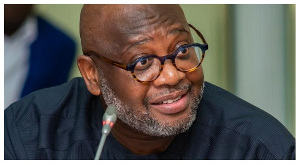The Ashanti Regional House of Chiefs has condemned the practice of abandoning useful projects started by previous governments.
Barima Sarfo Tweneboah-Koduah, the Chief of the Kumawu Traditional Area, made the statement on behalf of the House when the National Development Planning Commission organized a consultative forum in Kumasi on the Forty-Year National Development Plan.
It was to solicit public inputs for the preparation of the Plan, to guide the nation's development from 2018 to 2057.
Barima Tweneboah-Koduah said the practice of putting a stop to projects initiated by previous governments as a result of differences in political ideologies did not impact positively on sustainable development.
He said it had always been the desire of traditional rulers to see people in their communities in secured environments and healthy conditions.
This, he said, could become possible if government policies on Agriculture, Health, Education, Economic Planning, and Security, among others, were not politicized.
He stressed the need for such policies in such sectors to be binding on all governments to ensure synergy and continuity for sustainable development.
Mr Peter Anarfi Mensah, the Ashanti Regional Minister, praised the efforts of the NDPC by bringing all Ghanaians on board through the consultative process, to ensure ownership of the National Development Agenda.
He was hopeful this would ensure coherence in national development, and place Ghana on the path of development, just like Singapore, Malaysia among other countries.
Professor Kwesi Botchwey, the Chairman of the NDPC, emphasized the importance of a long-term development planning, which according to him, was sometimes underestimated.
He said history of post-war development in the developing world showed clearly that countries such as Korea, Taiwan and Malaysia who had concentrated on long-term national development planning, had over the years achieved high income growth than others.
Dr Nii Moi Thompson, the Director-General of the NDPC, in a presentation established why a long- term plan was priceless, adding that it would ensure national progress and sustainable development that would lead to actual reduction in poverty levels among Ghanaians.
He mentioned that such a development process would go a long way to reduce the party politicization of development process.
Dr Thompson said a development plan which was national in character stood a greater chance of being adhered to by successive governments than a sectorial policy.
Vision statements were made by some political parties, identifiable groups, such as student bodies, representation regional house of chiefs, farmers and fishermen associations, and persons with disability among others in the region.
Regional News of Friday, 28 August 2015
Source: GNA
















